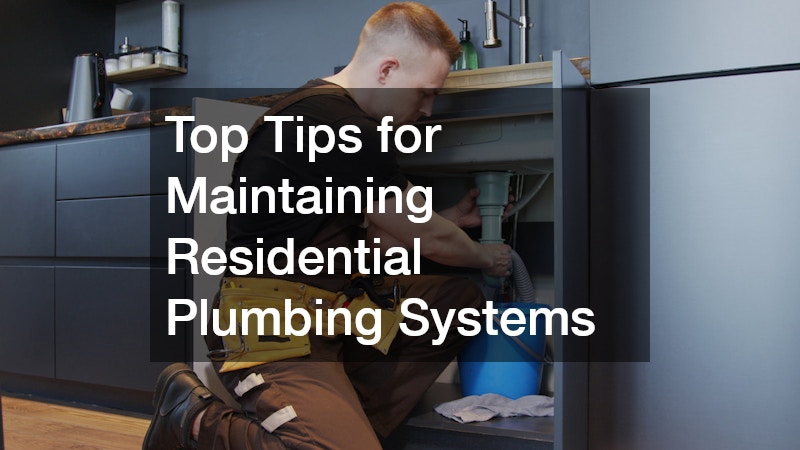In this article, we will explore essential tips and best practices for maintaining residential plumbing systems, providing guidance to ensure both longevity and efficiency. A well-maintained plumbing system is a cornerstone of every household, playing a vital role in daily comfort, hygiene, and safety. Neglecting routine care can lead to leaks, water damage, and costly repairs that disrupt your home and strain your budget.
Understanding how to properly care for your plumbing not only helps prevent emergencies but also improves overall system performance, conserves water, and extends the life of pipes, fixtures, and appliances. From simple preventative measures to routine inspections and maintenance schedules, these practices can save homeowners significant time, stress, and money over the years.
By following these tips, you’ll gain the knowledge and confidence needed to protect your home’s plumbing infrastructure and ensure it continues running smoothly for years to come.
How Can I Prevent Clogged Drains?
Preventative measures that homeowners can take to avoid clogs and blockages in their plumbing systems are crucial for maintaining a smooth operation. Simple practices such as using drain covers can significantly minimize the amount of debris entering your pipes. Additionally, regular cleaning of your drains with a mixture of vinegar and baking soda can help dissolve minor buildups before they turn into major issues.
One common source of clogs is grease buildup from cooking. It is essential to dispose of grease properly by letting it cool and then throwing it in the trash. Furthermore, educate all family members about what should or shouldn’t go down the drain, as many clogs result from foreign items being flushed inadvertently.
Another useful tip includes the installation of a regular maintenance schedule. By regularly inspecting and addressing minor issues, homeowners can prevent clogs from developing into headaches later on. Implementing a routine that involves snaking your drains every few months can keep your plumbing running smoothly.
What Are the Signs of Plumbing Issues?
Common signs that indicate a potential problem within your plumbing system that requires attention include unusual noises from pipes. If you hear gurgling or banging sounds, there may be air trapped in the system or even a serious clog building up. Staying attentive to these changes in sound can alert you to issues before they escalate.
Another sign of plumbing problems is water discoloration. If your water starts appearing brown or has an unusual odor, it may indicate corrosion in your pipes or a breach of contaminants. Homeowners should test their water if they notice these signs and consider getting a professional involved for further investigation.
In addition to visual and auditory cues, consistent water meter movement may signal leaks or inefficiencies within your plumbing. Regular monitoring of your water meter can help you catch these problems early, so you are not faced with unexpected bills or water damage in your home. By being vigilant for these signs, you can address problems proactively rather than reactively.
How Often Should I Schedule Plumbing Inspections?
Guidelines on the frequency of plumbing inspections are essential for maintaining an efficient system. Many experts recommend scheduling professional plumbing inspections at least once a year. Regular assessments not only identify issues but also allow for routine maintenance that can prolong the life of your plumbing system.
During these check-ups, professionals will typically inspect key components like the water heater, pipes, and fixtures. They will check for signs of wear, leaks, or corrosion and provide recommendations for necessary repairs or replacements. Homeowners should expect to receive a detailed report on the state of their plumbing after the inspection.
Though annual inspections are recommended, certain conditions may require more frequent evaluations. For example, homes with older plumbing systems or those that have experienced past plumbing issues may benefit from as many as two inspections per year. Keeping an open line of communication with your plumber about your specific situation can help determine what’s best for your home.
What Should I Do in Case of a Plumbing Emergency?
Steps to take when faced with a plumbing emergency to minimize damage and complications include shutting off the main water supply immediately. This quick action can halt the flow of water and prevent further damage to your property. Knowing the location of your main shut-off valve before an emergency strikes is crucial for every homeowner.
After stopping the water flow, contacting a licensed plumber should be your next step. Explain the situation clearly to allow them to prepare adequately before arriving at your home. Having this established relationship with a trusted plumber can provide peace of mind during emergencies.
In the interim, assess any other risks associated with the plumbing issue. For example, if a pipe bursts, look for electrical hazards or excessive flooding, and evacuate the area if necessary. Taking these precautions can ensure the safety of you and your loved ones while you manage the situation until professional help arrives.
By adhering to these tips and guidelines, homeowners can better maintain their plumbing systems and avoid unnecessary repairs and emergencies. Regular maintenance, vigilance for signs of trouble, and knowledge of emergency procedures are all critical elements of successful plumbing management. As you implement these practices, you’ll contribute to the longevity and efficiency of your home’s plumbing system, ensuring a smoother, hassle-free living environment.
